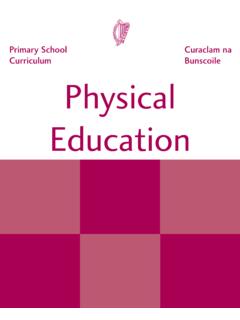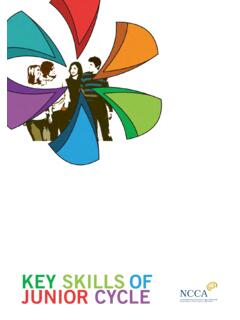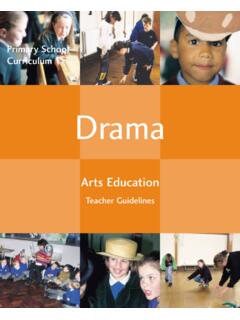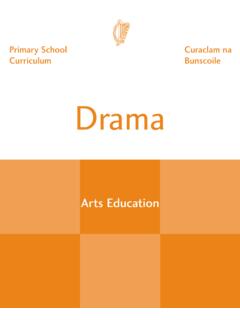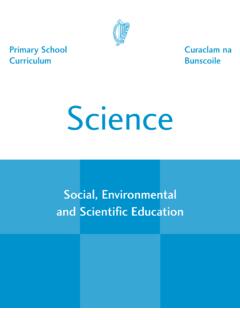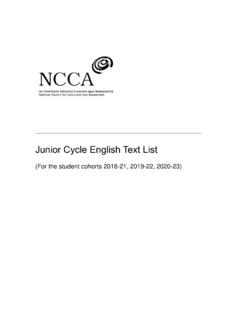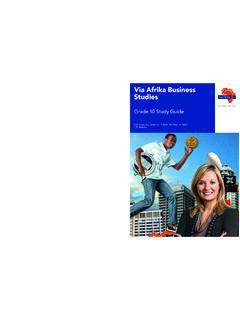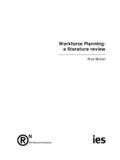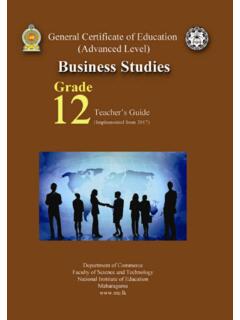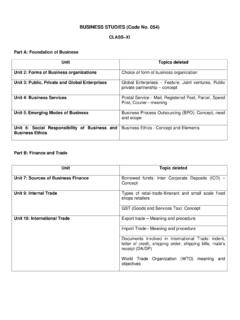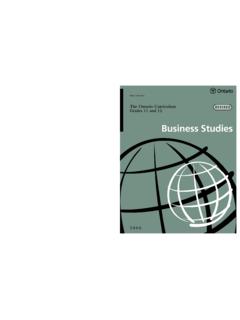Transcription of Junior Cycle Business Studies - Curriculum
1 Junior Cycle Business Studies Curriculum Specification Contents Page 3 Introduction to Junior Cycle Page 4 Rationale Page 5 Aim Page 6 Overview: Links Statements of Learning Key Skills Page 9 Overview: Course Progression from primary to senior Cycle Page 13 Expectations for Students Strand one: Personal finance Strand two: Enterprise Strand three: Our economy Page 17 Assessment & Reporting Assessing the Classroom-Based Assessments Assessment Task The final examination Page 23 Appendix 1. Glossary of Business terms Page 25 Appendix 2. Glossary of action verbs 3 Introduction to Junior Cycle Junior Cycle Business Studies Introduction to Junior Cycle Junior Cycle education places students at the centre of the educational experience, enabling them to actively participate in their communities and in society and to be resourceful and confident learners in all aspects and stages of their lives.
2 Junior Cycle is inclusive of all students and contributes to equality of opportunity, participation and outcome for all. The Junior Cycle allows students to make a greater connection with learning by focusing on the quality of learning that takes place and by offering experiences that are engaging and enjoyable for them, and relevant to their lives. These experiences are of a high quality, contribute directly to the physical, mental and social well-being of learners, and where possible, provide opportunities for them to develop their abilities and talents in the areas of creativity, innovation and enterprise. The learner's Junior Cycle programme builds on their learning to date and actively supports their progress in learning, and in addition, supports them in developing the learning skills that will assist them in meeting the challenges of life beyond school. 4. Junior Cycle Rationale Business Studies Rationale Young people are growing up in a globalised and dynamic world.
3 New opportunities and challenges will emerge in their lifetimes that are virtually unimaginable today. Developing technologies, environmental and societal challenges, demographics, global competition and changing consumer demand will drive these changes. Studying Business helps to equip students with the understanding, skills and attitudes to participate fully in an interconnected world. Business Studies encourages students to develop an appreciation of how their lives are shaped by economic and social factors. They are enabled to make informed decisions, to better manage their personal financial resources and to be adaptable, creative, and enterprising. Business Studies also improves their knowledge and understanding of good Business practice and of Business as a productive activity. Entrepreneurship enhances the quality of our collective and individual lives, often changing the way we work, communicate and live.
4 Business Studies provides an awareness, insight and positive attitude to entrepreneurship, demonstrating how it can improve our goods, services and institutions. Business Studies encourages students to develop skills for learning, skills for work and skills for life. It supports the development of analytical and critical thinking skills, encouraging students to be problem solvers. It reinforces the development of students' numeracy, literacy and digital technology skills by providing a real-life context for their application. Business Studies explores the interdependence of economic prosperity, societal well-being and the environment and encourages students to think and act as responsible and ethical citizens. They will be provided with a set of foundational skills, understandings and personal attributes, which will help them to engage with the dynamic Business environment and fulfil their potential in their personal and professional lives, now and into the future.
5 5. Junior Cycle Aim Business Studies Aim Business Studies aims to stimulate students' interest in the Business environment and how they interact with it. It develops skills, knowledge, attitudes and behaviours that allow them to make informed and responsible decisions with all of the resources available to them, ensuring their and society's well-being, while becoming more self-aware as learners. 6. Junior Cycle Overview: Links Business Studies Overview: Links Tables 1 and 2 on the following pages show how Junior Cycle Business Studies is linked to central features of learning and teaching in Junior Cycle . Table 1: Links between Junior Cycle Business Studies and the statements of learning STATEMENTS OF LEARNING. The statement Examples of relevant learning SOL 7: The student values what it means Students will evaluate their consumer choices, to be an active citizen, with rights and understanding how their choices impact responsibilities in local and wider contexts.
6 Positively and negatively on their community and the wider world. SOL 9: The student understands the origins and Students will examine the extent to which an impacts of social, economic, and environmental organisation can impact on the economy, people aspects of the world around her/him. and environment in which it is based. SOL 14: The student makes informed financial Students will manage their financial resources, decisions and develops good consumer skills. understanding the benefits to shop wisely and ethically, while evaluating financial risks. SOL 18: The student observes and evaluates Students will use numerical and graphical empirical events and processes and draws valid data to analyse and problem-solve topics and deductions and conclusions. questions in order to make effective decisions. SOL 22: The student takes initiative, is Students will conduct market research in order innovative and develops entrepreneurial skills.
7 To appreciate entrepreneurship and to inspire curiosity and innovation. SOL 24: The student uses technology and Students will access, communicate and/or digital media tools to learn, communicate, work present information using digital technology and think collaboratively and creatively in a and explore its impact on how Business is responsible and ethical manner. conducted. KEY SKILLS. 7 In addition to their specific content and knowledge, the subjects and short courses of Junior Cycle provide students with opportunities to develop a range of key skills. Figure 1 below illustrates the key skills of Junior Cycle . There are opportunities to support all key skills in this course, but some Junior Cycle Business Studies are particularly significant. Overview: Links Key Skills of Junior Cycle Figure 1: The elements of the eight key skills of Junior Cycle Developing my understanding and enjoyment of words and language Reading for enjoyment and with critical understanding Knowing myself Writing for different purposes Making considered decisions Expressing ideas clearly and accurately Setting and achieving personal goals Developing my spoken language Being able to reflect on my own learning Exploring and creating a variety of texts, including multi-modal texts.
8 Using digital technology to manage myself and my learning Using language Using number Listening and expressing myself Performing and presenting BEING. Discussing and debating LITERATE. Using digital technology to communicate Being healthy and COMMUNICATING MANAGING physically active MYSELF Being social Being safe Being spiritual Being confident Developing good relationships and dealing WORKING. WITH. OTHERS. KEY Being positive about learning SKILLS. with conflict Being responsible, safe STAYING and ethical in using Co-operating WELL digital technology Respecting difference Contributing to making the world a better place Learning with others BEING. Working with others CREATIVE MANAGING Being curious through digital INFORMATION. & THINKING Gathering, recording, technology organising and evaluating BEING information and data NUMERATE. Thinking creatively and critically Reflecting on and evaluating my learning Imagining Using digital technology Exploring options and alternatives to access, manage and share content Implementing ideas and taking action Expressing ideas mathematically Learning creatively Estimating, predicting and calculating Stimulating creativity using digital Developing a positive disposition technology towards investigating, reasoning and problem-solving Seeing patterns, trends and relationships Gathering, interpreting and representing data Using digital technology to develop numeracy skills and understanding 12914 NCCA Jr Cycle Key Skills Poster 1 23/10/2015 15:12.
9 Table 2 below identifies some of the elements that are related to learning activities in Business 8 Studies . Teachers can also build many of the other elements of particular key skills into their classroom planning . Junior Cycle Business Studies Table 2: Links between Junior Cycle Business Studies and key skills Overview: Links KEY SKILLS. Key skill Example of key skill Examples of associated student learning activities element Being creative Implementing ideas Students will generate ideas on products/services in and taking action a creative environment and will be empowered to realise these ideas. Being literate Exploring and creating Students will access and engage with oral, written a variety of texts, and multi-modal texts in conducting project research including multi-modal and in presenting their findings. texts Being numerate Seeing patterns, trends Students will evaluate how the prices of particular and relationships goods and services are determined, understanding the interaction of demand and supply.
10 Communicating Using digital Students will interact through social media and technology to other digital technology in order to explore relevant communicate Business issues. Managing Gathering, recording, Students will prepare financial accounts, assess the information and organising, and financial position and present their analysis in tabular thinking evaluating information and/or graphic formats. and data Managing Making considered Students will evaluate risks associated with saving myself decisions and borrowing money and make informed and responsible financial decisions. Staying well Being positive about Students will discuss current issues in the Business learning environment and their enthusiasm for and curiosity about Business will be stimulated. Working with Developing good Students will collaborate and negotiate with others in others relationships and the classroom to explore views and complete tasks in dealing with conflict a range of contexts and activities.
